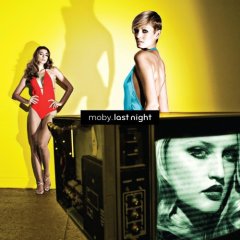Let's face it, Moby never seemed like a very fun or cool guy. With his bookish personality and looks, he's easier to picture sipping tea than cutting rugs at thumping clubs. This places Last Night, a 14-song sonic allegory about painting the town red, into a strange realm. Is it about tea consumption? Is Moby a partier? Is it fantasy? Is Moby is in on the joke?
Just when you start to trust his self-proclaimations of vegan, pro-choice, celibate, environmentalist, born-again Christian, straight-edge, straight (but gay-bashed!), intellectual knob-tweaking composer and guitarist, he goes off and writes confessions about downing bags of cocaine with prostitutes. Is he telling the truth about anything? Does he live a fragmented existence? Does he just grin and nod whenever the press makes an absurd claim? Is he just a liar? For the present, let's just assume that the petite fellow is not conducting an incomprehensibly layered longitudinal study on humanity, but rather that his creative compass just goes haywire at regular intervals.
Moby's career began with a four-album climb to the top of the brainy, layered electronic dance world. Just when he reached a critical and artistic acme with Everything is Wrong, he figured he should filter alternarock through his lens and ended up with a dull, sputtering, nonsensical diatribe-ridden flop. He returned back to Earth with 1998's Play, a multiplatinum, soul-infused earworm farm. The songs were sold for commercial use so rapidly that tremendous financial success significantly preceded the album's retail success.
Naturally, after his second shimmer of brilliance, he chose again to experiment, this time with duller ambience and he spit out a couple of aimless, unfocused pieces. According to my best signal-processing techniques in pattern recognition and prediction, Last Night should signify the third coming of the enigmatic alien, but he's not quite on schedule.
Indeed, there is nothing that merits technical criticism. The songs are well crafted, catchy, and have a strong balance of vocal and instrumental sections. The album, by all physical standards is a good one. In many senses, however, Last Night feels like the techno equivalent of a classically trained guitarist with top-of-the-line gear playing a Jimi Hendrix song. The notes and tones are 100% accurate, but there is no soul.
I've done my best to attribute the aimlessness of the song flow to the various unpredictable and random encounters and stops along Moby's night-long journey, but it just doesn't sit right. Something is still missing. Perhaps if there were more tangible, distinctive presentations of venue characteristics or street characters, the listener would become more immersed in the experience.
Most of the songs feel like nostalgic jokes, or at least tongue-in-cheek winky-winks. The best example of the tone is "Everyday Its 1989," built on drum-machine default fills, fast-piano vamps, and the screamy diva vocals of bands like C&C Music Factory or Real McCoy…but alas, no rap. I've written it for Moby for any future remixes of the song:
"My man Moby, mixing up the beats, hopping to the streets
does he dance on the floor or in between the sheets
Shiny bald head, drinking water with a lime
he parties everyday like it's 1989 — yeah 1989"
In "I Love to Move in Here," Moby loops the lyric "Old School, taking you back again" enough to almost convince us that he's actually creating a time warp, but we don't quite manage to step through. Something isn't quite right. Just like the missing rap incident, all of the numbers fall short of emulating their influences enough to be worth a giggle at a party, but they are still too imitative to accept as anything original. As a result, Last Night is full of genre and era bending numbers that, unfortunately, come off as academic exercises in recreation rather than anything personal or introspective. You can get a bunch of people together to reenact a Civil-War battle, but no one is really afraid of dying or concerned about the fall and imprisonment of their nation. In fact, they might just have a tattered uniform fetish.
So, even though Last Night is full of good songs that will make great commercials, movie scores, and no-dancing-intended dance parties, the album doesn't convince me that I should revisit it. Based on the song construction, Moby seems fixated on creating a post-modern dance encyclopedia rather than a work of creative fiction. We should have listened to the glasses because he might just have a library fetish.
